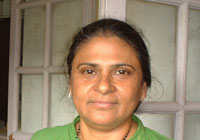About UNICEF
Home-grown solutions
 |
| Sheela Patel chairs the board of Shack/Slum Dwellers International. |
By Celine d’Cruz and Sheela Patel, Shack/Slum Dwellers International
UNICEF’s flagship report, ‘The State of the World’s Children 2012: Children in an Urban World’, will launch on 28 February, focusing attention on children in urban areas. For this essay series, 'Perspective on the World's Children', child rights advocates around the world were invited to share their views on the issues facing urban children.
MUMBAI, India, 24 February 2012 – One of the more promising developments in the effort to reduce urban poverty is the emergence of networks of grassroots groups in which women play a prominent role as agents of positive change in their communities and around the world.
We have had the privilege of working with one such network – Shack/Slum Dwellers International (SDI) – since its inception in 1996. There are similar networks of street vendors, home-based workers and waste pickers.
We believe that unless we band together, the challenges of urban poverty will not be addressed. By joining forces and pooling our knowledge, experience and creative solutions, we can achieve action on a meaningful scale. So it is that slum dwellers in such cities as Nairobi, Kenya, and Kampala, Uganda, are consulting counterparts in Mumbai, India, who persuaded government, railway authorities and international development lenders to relocate some 20,000 households as part of an effort to update the rail system. Ultimately, the Mumbai slum residents were able to design their own resettlement, moving from locations where many children had been killed by trains passing a mere 9 metres from homes.
SDI has hundreds of thousands of federated members in cities spread across 34 countries. They work for decent housing and infrastructure, usually seeking to collaborate with local government. This takes years of organizing, mobilizing and building relationships. It begins when women form collectives to pool savings and make loans to one another so they can put food on the table, buy medicines, get transport to find jobs and pay for children’s education. In time, they examine their environs and identify what they need.
 |
| Celine d’Cruz is the coordinator of Shack/Slum Dwellers International. |
At the top of the list of needs is security of tenure. Children need a decent place to live, places to play and neighbourhoods in which they feel safe. They need clean water and toilet solutions that do not force two-year-olds to stand in line or expose adolescent girls to harassment. Security of tenure makes it easier to fulfil these needs. It also frees children from the stress and lost opportunities that come with the ever-present threat of being forcibly evicted or having their homes demolished. Insecurity of tenure means that women and children must work near their dwellings so they are close at hand in case of eviction. Children serve as ‘road runners’, warning parents and neighbours when a demolition squad has been sighted; as their homes are destroyed, they scramble to protect whatever they can from being taken by the police. Living in constant fear of eviction erodes whatever resources a family has. But when secure tenure is negotiated, children start going to school, and parents feel more confident about investing in proper shelter.
Here, too, the experience of grassroots networks is instructive. An essential element of SDI’s work is making what was invisible hard to ignore. Cities often have no data recording the presence of people living ‘illegally’ on pavements, under bridges and on waste land. These residents are not counted in the census; they are excluded from voting lists; and their children’s births are not recorded. But when their presence is documented through settlement profiles and family identification papers, it becomes clear that they are gainfully employed, contribute to the city’s economy and are worthy of citizenship. Because such documentation also identifies the children in each household, it becomes possible to determine how many need immunization and schooling, how many work and what kind of work they do. In addition to being our basic organizing tool, this process of enumeration enables negotiation for tenure and service provision. The process yields another benefit for children – seeing parents, especially their mothers, negotiate collectively to improve lives and surroundings is a vital part of children’s socialization.
Clearly, these networks cannot solve the problems of all children. But they are important allies in the endeavour to safeguard child rights, and they undertake critical foundational work to make children’s homes and neighbourhoods safe and secure. They can bridge the gap between the formal urban development world and poor urban communities, promoting solutions that work for their members. We know from our work that poor communities are fed up with others setting development priorities for them. True alliances and partnerships mean making choices together.
Sheela Patel chairs the board of SDI. She works with the Indian non-governmental organizations Mahila Milan, the National Slum Dwellers Federation and the Society for the Promotion of Area Resource Centres (SPARC), which was established in 1984 to address issues faced by the pavement dwellers of Mumbai. Celine d’Cruz is the coordinator of SDI. A founder of SPARC, she began working for the rights of pavement and slum dwellers in India in the early 1980s, helping impoverished women in Mumbai bargain collectively to bring housing, education and health services to their families.

